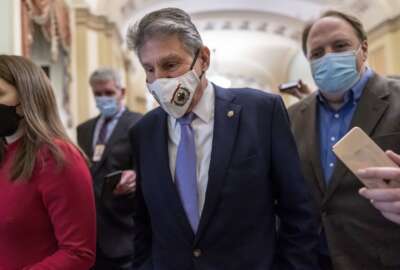Guess what? Federal contractors are coming off a great year
Despite the strength of the market, dark clouds hover over contractors. That's according to Larry Allen, president of Allen Federal Business Partners. He explained...
Best listening experience is on Chrome, Firefox or Safari. Subscribe to Federal Drive’s daily audio interviews on Apple Podcasts or PodcastOne.
Federal sales boomed during fiscal 2021, with the General Services Administration buying vehicles reporting sales records. That shouldn’t be a surprise given record appropriations in response to the pandemic. Our guest says that despite the strength of the market, dark clouds hover over contractors. Larry Allen is president of Allen Federal Business Partners and joined Federal Drive with Tom Temin to discuss.
Interview transcript:
Tom Temin: And just what are the dark clouds hanging over what was a record year?
Larry Allen: The dark clouds are the whole host of new rules and regulations that are coming down, not just on GSA Schedule contractors, things like the vaccine mandate, of course, affect contractors across the board. But specifically inside GSA, talking about putting new rules in on the contractor minimum wage, that’s new to the schedule, if not new to government procurement. New rules on greenhouse gas emissions, trying to find ways to provide positive evaluations for people who are eco-friendly, that’s new ground and requires contractors to track things that they may not be tracking now, and not just track them, but try to quantify them. In addition, you have new cyber reporting requirements, and of course, the continued imposition of secure supply chain policies. Those are just some things that are government unique burdens that add to the cost of doing business through what are admittedly popular contract vehicles. But keep in mind that many of the companies that sell through these are inherently commercial, and that the new terms GSA was to add are really unique to these companies government business.
Tom Temin: And then there is the possibility of services contractors being forced to hire their competitors’ employees, should they win a incumbents contract away from that incumbent.
Larry Allen: That’s right. We’ve seen this circle around before, Tom, it pops up every few years, particularly when we have a Democrat in the White House, as we do now with President Biden, this is something that they tried to do for labor unions. And what it means is, if you’re a contractor recompeting for a services project, maybe you have a new and innovative way of developing that service. You win the contract, you want to implement your innovative solution, not so fast, because to the extent that you’re hiring people, the people who worked for the contractor you just displaced get the right of first refusal to cap their jobs in the new contract, whether or not you are bidding for exactly those jobs, or are proposing to deliver that solution in a new way. That poses some interesting questions for contractors. Is there any real benefit to being innovative if all I am going to do is have to hire somebody else’s people to do the work that I just won?
Tom Temin: Or is it worthwhile spending time and money training and developing your people if they are simply public property to be taken by whoever happens to win the next contract?
Larry Allen: Right. And in fact, we’ve seen this happen in government contracts, to some extent over time, Tom, when the same workers work for the same agencies, the color of their badge changes based on the company they’re working for. But this is a little bit more than that. You’re talking about people who today there may be 100 people supporting a contract in a given area. It gets recompeted, the recompeting contractor says I don’t need 100 people, I need 60 people and I’m going to do the rest with technology and AI. What are you gonna do with some of those people that aren’t going to have a position that you can offer them, and who gets to stay on board? And maybe you had your own specially trained people that you are going to dedicate to this contract. This is something that we see come back, and it is a real concern for service contractors.
Tom Temin: Sure. And maybe the government didn’t hire the old company because it couldn’t stand the people that it had on the contract.
Larry Allen: Right. For a reason. There may be been a reason that somebody else won the recompete.
Tom Temin: We’re speaking with Larry Allen, president of Allen Federal Business Partners and also from the Coalition for Federal Procurement, which you headed many years ago. Their recent conference, it came to light how many of the GSA existing vehicles are up for renewal now, and that’s so to the positive side of the ledger, there’s some opportunities coming.
Larry Allen: There really are some positive sides at GSA, Tom, they’re a very busy agency. They announced last week that they are going to start planning for Alliant 3. Alliance 2 is the agency’s main IT indefinite delivery-indefinite quantity vehicle. It’s very popular, so popular in fact that it is going to hit its contract ceiling earlier than anticipated. That’s why GSA is starting on the follow-on earlier than anticipated. So that’ll be fun. That comes at the same time that the agency is trying to get their small business IT vehicle, Polaris, out the door. GSA announced last week that they’re going to start rolling out the RFP for that in January, starting with women-owned small businesses, and then rolling it out gradually to others. This comes on top of the agency just now awarding its ASTRO contract, that does some very technical things through GSA’s FEDSIM organization. And then not to mention the Services MAC that is under construction that will replace GSA’s services contract OASIS.
Tom Temin: Yeah. So these are coming along. And I want to get back to the point we opened with, maybe you could just give us some of the numbers around sales that were much higher than people maybe expected because of the pandemic. But the government doesn’t have recessions or depressions or setbacks.
Larry Allen: Well, the government was blessed, as you said in the outset Tom, with full year preparations or close to it, and a robust FY 20 to follow up on. And at the same time, there were some definite challenges to meet via acquisition. Many of them were pandemic related, everything from masks and gloves to making sure that remote workers have laptops and other tools they needed to work from home. And where do you go to get those needs filled easily and quickly while you go to standing contract vehicles, just like the ones that GSA has? So it shouldn’t be a surprise that federal agencies turn to GSA to meet those across the board needs. Their result is that if you look in the services portfolio, and you count all of the service portfolio work, including this purchase card work that GSA does, sales in that portfolio, that again including Purchase Card were over $50 billion for FY 21, if you look in the IT world and just the schedules world and the ITG WAC, the number was well over $30 billion through those programs. Tremendous amount of business that goes through these. I think it shows a couple things. One, agencies trust GSA to deliver them quality solutions. B, it’s easy for agencies to use these vehicles. And three, contractors on those programs have well established reputations that federal agencies can trust.
Tom Temin: Larry Allen is president of Allen Federal Business Partners. Very mixed bag here. Thanks so much for joining me.
Larry Allen: Tom. Thank you and wish your listeners happy selling.
Copyright © 2025 Federal News Network. All rights reserved. This website is not intended for users located within the European Economic Area.
Tom Temin is host of the Federal Drive and has been providing insight on federal technology and management issues for more than 30 years.
Follow @tteminWFED






